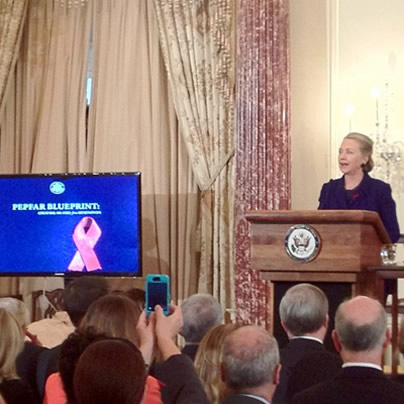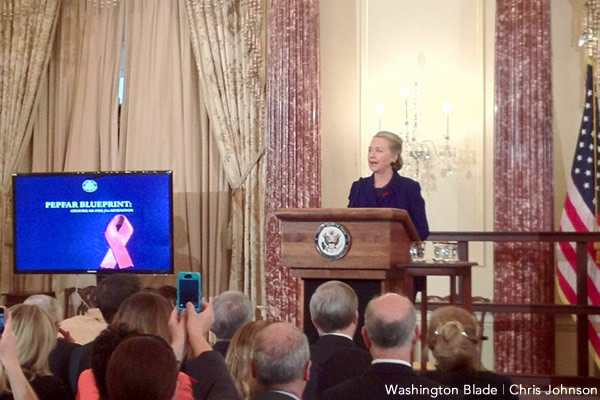National
Clinton unveils ‘blueprint’ to achieve ‘AIDS-free generation’
MSM identified as key population in global epidemic


Secretary of State Hillary Clinton on Thursday unveiled the global AIDS blueprint (Blade photo by Chris Johnson)
The Obama administration unveiled on Thursday a “blueprint” for confronting the global AIDS epidemic that includes as one of its goals targeting populations that are most vulnerable to HIV/AIDS — including men who have sex with men.
Secretary of State Hillary Clinton touted the plan during a ceremony at the State Department as a tool to achieve the vision of an “AIDS-free generation” that she previously articulated a year ago.
“Now, make no mistake about it: HIV may well be with us into the future,” Clinton said. “But the disease that it causes need not be. We can reach a point where virtually no children are born with the virus, and as these children become teenagers and adults, they are at a far lower risk of becoming infected than they are today. And if they do acquire HIV, they have access to treatment that helps prevent them from not only from developing AIDS, but from passing the virus on to others.”
The blueprint seeks to advance the President’s Emergency Plan for AIDS Relief, which was started under former President George W. Bush. Among the five goals listed in the blueprint is “going where the virus is” to seek out populations that are most at-risk for contracting HIV/AIDS, including people who inject drugs, sex workers, those trafficked into prostitution — as well as men who have sex with men.
The plan offers statistics on the prevalence of HIV/AIDS infection in the LGBT community overseas:
In certain studies, HIV prevalence among MSM has been found to be as high as 25% in Ghana, 30% in Jamaica, 43% in coastal Kenya and 25% in Thailand. Among transgender people, HIV prevalence is thought to be even higher. Data presented at the 2008 International AIDS Conference in Mexico showed HIV prevalence of over 25% among transgender people in three Latin American countries and prevalence ranging from 10% to 42% in five Asian countries.
Other goals outlined within the blueprint are boosting prevention and treatment through methods such as condom distribution and male circumcision; promoting sustainability, efficiency and effectiveness, such as through the distribution of generic drugs; encouraging financial contributions from other countries facing the HIV/AIDS epidemic; and employing science-based efforts to guide efforts.
During the 19th International AIDS Conference in July in D.C., Clinton announced she had directed U.S. Global AIDS Coordinator Eric Goosby to develop the “blueprint” in time for World AIDS Day this year.
HIV/AIDS experts had varying reactions to the plan, although generally they were pleased that the U.S. government is taking an additional step forward in confronting the global epidemic.
Kenneth Mayer, co-chair of the IDSA Center for Global Health Policy’s Scientific Advisory Committee, praised the study for including concrete data to illustrate what must be done to achieve an “AIDS-free generation.”
“We are especially encouraged that the blueprint provides concrete numbers in affected countries to illustrate the work that must be done to reach a tipping point, when the numbers of people becoming infected with HIV are surpassed by the numbers receiving life-saving medicine,” Mayer said.
But Michael Weinstein, president of AIDS Healthcare Foundation, called the blueprint “mostly more talk and spin by the Obama administration” in the way it handles the epidemic.
“There are some generic pledges in the plan to scale-up testing and treatment, but the blueprint does not offer concrete plans of how we will actually get there,” Weinstein said.
Among the issues cited by Weinstein is a pledge to “work toward the elimination of new HIV infections among children by 2015 and keeping their mothers alive” without providing details on how to get there and having no plan for drug pricing.
Nonetheless, Clinton said during her address that she expects the blueprint to serve as a starting point for future U.S. leaders in their efforts against the epidemic.
“So with this blueprint, I firmly believe we have laid out a plan that every American president and secretary and Congress will want to build on,” Clinton said. “And I urge other countries to develop their own blueprints, because to reach an AIDS-free generation, we have to keep moving forward.”

The Comings & Goings column is about sharing the professional successes of our community. We want to recognize those landing new jobs, new clients for their business, joining boards of organizations and other achievements. Please share your successes with us at [email protected].
Congratulations to Gil Pontes III on his recent appointment to the Financial Advisory Board for the City of Wilton Manors, Fla. Upon being appointed he said, “I’m honored to join the Financial Advisory Board for the City of Wilton Manors at such an important moment for our community. In my role as Executive Director of the NextGen Chamber of Commerce, I spend much of my time focused on economic growth, fiscal sustainability, and the long-term competitiveness of emerging business leaders. I look forward to bringing that perspective to Wilton Manors — helping ensure responsible stewardship of public resources while supporting a vibrant, inclusive local economy.”
Pontes is a nonprofit executive with years of development, operations, budget, management, and strategic planning experience in 501(c)(3), 501(c)(4), and political organizations. Pontes is currently executive director of NextGen, Chamber of Commerce. NextGen Chamber’s mission is to “empower emerging business leaders by generating insights, encouraging engagement, and nurturing leadership development to shape the future economy.” Prior to that he served as managing director of The Nora Project, and director of development also at The Nora Project. He has held a number of other positions including Major Gifts Officer, Thundermist Health Center, and has worked in both real estate and banking including as Business Solutions Adviser, Ironwood Financial. For three years he was a Selectman, Town of Berkley, Mass. In that role, he managed HR and general governance for town government. There were 200+ staff and 6,500 constituents. He balanced a $20,000,000 budget annually, established an Economic Development Committee, and hired the first town administrator.
Pontes earned his bachelor’s degree in political science from the University of Massachusetts, Dartmouth.
Kansas
ACLU sues Kansas over law invalidating trans residents’ IDs
A new Kansas bill requires transgender residents to have their driver’s licenses reflect their sex assigned at birth, invalidating current licenses.

Transgender people across Kansas received letters in the mail on Wednesday demanding the immediate surrender of their driver’s licenses following passage of one of the harshest transgender bathroom bans in the nation. Now the American Civil Liberties Union is filing a lawsuit to block the ban and protect transgender residents from what advocates describe as “sweeping” and “punitive” consequences.
Independent journalist Erin Reed broke the story Wednesday after lawmakers approved House Substitute for Senate Bill 244. In her reporting, Reed included a photo of the letter sent to transgender Kansans, requiring them to obtain a driver’s license that reflects their sex assigned at birth rather than the gender with which they identify.
According to the reporting, transgender Kansans must surrender their driver’s licenses and that their current credentials — regardless of expiration date — will be considered invalid upon the law’s publication. The move effectively nullifies previously issued identification documents, creating immediate uncertainty for those impacted.
House Substitute for Senate Bill 244 also stipulates that any transgender person caught driving without a valid license could face a class B misdemeanor, punishable by up to six months in jail and a $1,000 fine. That potential penalty adds a criminal dimension to what began as an administrative action. It also compounds the legal risks for transgender Kansans, as the state already requires county jails to house inmates according to sex assigned at birth — a policy that advocates say can place transgender detainees at heightened risk.
Beyond identification issues, SB 244 not only bans transgender people from using restrooms that match their gender identity in government buildings — including libraries, courthouses, state parks, hospitals, and interstate rest stops — with the possibility for criminal penalties, but also allows for what critics have described as a “bathroom bounty hunter” provision. The measure permits anyone who encounters a transgender person in a restroom — including potentially in private businesses — to sue them for large sums of money, dramatically expanding the scope of enforcement beyond government authorities.
The lawsuit challenging SB 244 was filed today in the District Court of Douglas County on behalf of anonymous plaintiffs Daniel Doe and Matthew Moe by the American Civil Liberties Union, the ACLU of Kansas, and Ballard Spahr LLP. The complaint argues that SB 244 violates the Kansas Constitution’s protections for personal autonomy, privacy, equality under the law, due process, and freedom of speech.
Additionally, the American Civil Liberties Union filed a temporary restraining order on behalf of the anonymous plaintiffs, arguing that the order — followed by a temporary injunction — is necessary to prevent the “irreparable harm” that would result from SB 244.
State Rep. Abi Boatman, a Wichita Democrat and the only transgender member of the Kansas Legislature, told the Kansas City Star on Wednesday that “persecution is the point.”
“This legislation is a direct attack on the dignity and humanity of transgender Kansans,” said Monica Bennett, legal director of the ACLU of Kansas. “It undermines our state’s strong constitutional protections against government overreach and persecution.”
“SB 244 is a cruel and craven threat to public safety all in the name of fostering fear, division, and paranoia,” said Harper Seldin, senior staff attorney for the ACLU’s LGBTQ & HIV Rights Project. “The invalidation of state-issued IDs threatens to out transgender people against their will every time they apply for a job, rent an apartment, or interact with police. Taken as a whole, SB 244 is a transparent attempt to deny transgender people autonomy over their own identities and push them out of public life altogether.”
“SB 244 presents a state-sanctioned attack on transgender people aimed at silencing, dehumanizing, and alienating Kansans whose gender identity does not conform to the state legislature’s preferences,” said Heather St. Clair, a Ballard Spahr litigator working on the case. “Ballard Spahr is committed to standing with the ACLU and the plaintiffs in fighting on behalf of transgender Kansans for a remedy against the injustices presented by SB 244, and is dedicated to protecting the constitutional rights jeopardized by this new law.”
National
After layoffs at Advocate, parent company acquires ‘Them’ from Conde Nast
Top editorial staff let go last week

Former staff members at the Advocate and Out magazines revealed that parent company Equalpride laid off a number of employees late last week.
Those let go included Advocate editor-in-chief Alex Cooper, Pride.com editor-in-chief Rachel Shatto, brand partnerships manager Erin Manley, community editor Marie-Adélina de la Ferriére, and Out magazine staff writers Moises Mendez and Bernardo Sim, according to a report in Hollywood Reporter.
Cooper, who joined the company in 2021, posted to social media that, “Few people have had the privilege of leading this legendary LGBTQ+ news outlet, and I’m deeply honored to have been one of them. To my team: thank you for the last four years. You’ve been the best. For those also affected today, please let me know how I can support you.”
The Advocate’s PR firm when reached by the Blade said it no longer represents the company. Emails to the Advocate went unanswered.
Equalpride on Friday announced it acquired “Them,” a digital LGBTQ outlet founded in 2017 by Conde Nast.
“Equalpride exists to elevate, celebrate and protect LGBTQ+ storytelling at scale,” Equalpride CEO Mark Berryhill said according to Hollywood Reporter. “By combining the strengths of our brands with this respected digital platform, we’re creating a unified ecosystem that delivers even more impact for our audiences, advertisers, and community partners.”
It’s not clear if “Them” staff would take over editorial responsibilities for the Advocate and Out.


















